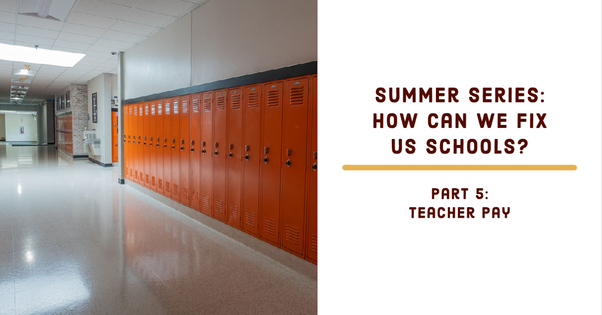|
Oh, the next topic in how to improve US schools is a big one, but it’s also the one that has the least amount of good solutions. Have you figured out what I am talking about yet? It’s teacher pay. Teacher pay is some of the lowest out there, and it’s frankly one of the major reasons I moved the direction I did in my career. Is there even a way to fix it? The best answer is maybe, but it all starts with the ways schools are funded, and we all know when politics are involved it’s more of a crap-shoot.
School funding predominantly relies on property taxes. The original model is that local communities charge that fee, and then it in turn was pushed back into schools. Obviously, as schools have become more complex (with things like sports, technology, the arts, and more), the cost to run districts and local school buildings has skyrocketed with districts like Atlanta Public Schools pushing into the billion dollar budget range. Where does that extra money come from? It mostly comes from places like the state and the federal government and there are usually requirements attached. Sometimes those requirements then can be a hindrance to what actually happens in a classroom. Teacher salaries are usually an underlying part of the state funding and grant process. In most states, the state sets a base salary for teachers in the state that’s part of that process, and then the local school districts can add funds on top of that to increase those salaries as needed. A good example of this is in Atlanta, where Atlanta Public Schools actually pays some of the highest salaries in the metro as incentive to attract talent from the suburban districts. Treating salaries this way though causes a whole lot of disparity in the quality of teachers that is able to be attracted into a school district. Big metro districts can pull teachers from some of the surrounding suburbs because they can pay more, while rural districts almost always depend on community members becoming teachers because their vested interest in that community overcomes issues with the low salary. These community members are also the ones who understand the low salary can often carry you further because the cost of living is lower. So, in this complicated process, how do we give teachers more? I think almost everyone who understands public education realizes they need more (there are those who think the job is easy), but government money is always a tough thing to get. It also all starts with our favorite piece, politics. One of the first things we can do to increase teachers salaries is close loopholes. I know in the district that I live in that if you are of a certain advanced age you don’t even have to pay the property tax that trickles down to schools. If we truly take schools as community investments, it should be something that everyone contributes to. There are also loopholes where anyone can essentially transfer that tax receipt over to private schools. While I can understand why someone whose children are enrolled should be able to do this, allowing anyone to just take more money off the table that can be used to keep and retain public school teachers. Taking that public school money no matter what the loophole is should be one of the last things that ever happens, yet the trend seems to be to go the other way and have that increase. It is possible to also increase teaching salaries in creative ways. What if you went to the community and you said, “What skills do you want our kids to have?” Then you turn around in return and ask the community to contribute to teaching salaries. Could you get enough for a nice increase? Many teachers also are taking extra jobs to make ends meet. What if we did that in an organized way, and made that salary worth it? Could you have teachers staff a store, event or something else that isn’t taxing, but could give them that extra income they need? I am sure there are hundreds of other creative ideas out there, and I would love to hear some others. The key is that teacher salary has to change. Teachers aren’t paid enough, and I think that is incredibly clear. To change that issue though, we have to rethink funding, and that’s the hard part. Hopefully, we can get creative, but we can also get the politics to work.
0 Comments
Leave a Reply. |
Archives
January 2023
Categories |

 RSS Feed
RSS Feed
